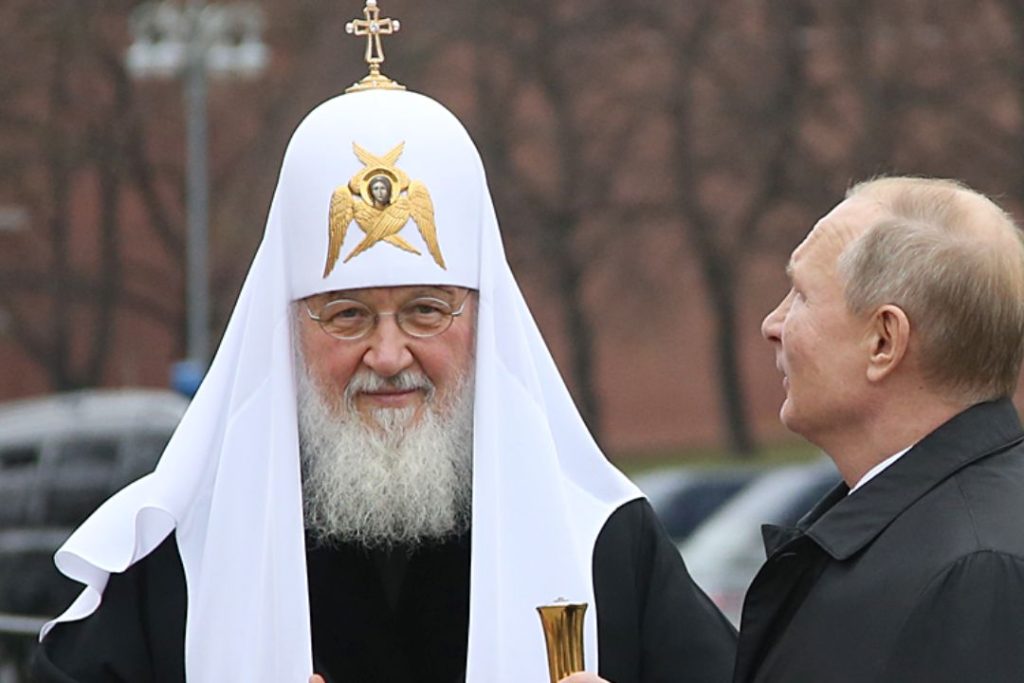Patriarch of Moscow, Kirill defends the invasion of Ukraine and curses the West. But he loves Switzerland, which he has visited dozens of times. His declassified archives explored by the Swiss federal police confirmed that he was also a KGB agent.
Kirill spied on Switzerland for the KGB in the 1970s – Le Matin Dimanche
Vladimir Putin, a former KGB spy, and Kirill are very close. The Russian Orthodox Patriarch Kirill, a fervent supporter of the invasion of Ukraine, spied on Switzerland for the KGB in the 1970s, according to Le Matin Dimanche and the German-language newspaper SonntagsZeitung, which were able to consult declassified archives.
At the tensest time of the Cold War, Kirill was living in Geneva to officially represent the Moscow Patriarchate at the World Council of Churches. The official objective of the WCC is harmony among Christians through ordinary concrete achievements.
In 1971, Kirill, whose civilian name is Vladimir Mikhailovich Gundyaev, began his career as a priest in the Soviet Union. In this atheistic state, the Orthodox Church was struggling to survive. He was sent to Geneva to represent the Moscow Patriarchate at the World Council of Churches.
Code name “Mikhailov”
But his activity as a priest is only one side of the coin. The Russian Church had made a pact with the Soviet regime. The church could survive in the atheistic and communist Soviet Union and have little openness towards foreign countries.
But in exchange, the Russian Orthodox Church would then have agreed to spy for the Moscow regime. According to declassified archives, Kirill was already a KGB agent, code name “Mikhailov,” in February 1972, when he lived in Geneva.
Kirill’s mission was also to influence the World Council of Churches, which was infiltrated by the KGB, according to RTS. The Soviets wanted the Geneva institution to denounce the United States and its allies and to moderate its criticism of the lack of religious freedom in the USSR.
Today, the Russian church refuses to comment on Kirill’s spying activity in Geneva. And the WCC says it has “no information” on the subject.
The spiritual leader of more than 150 million faithful
As for the patriarch, he continues to preach on the Kremlin’s line. In February, the Russian Orthodox Church’s head gave a personal ban to priest Ioann Koval, a cleric at the Church of St. Andrew the Apostle in the Moscow neighborhood of Lublino.
As per Kirill’s ruling, Koval can no longer conduct services because he substituted the word “peace” for “victory” during prayer, according to independent news outlet Sota, citing a directive from the patriarch himself.
In January, he was again seen, silver wand in hand, condemning the “madmen” who dream of “defeating great Russia” and risking bringing about “the end of the world.”
These words carry weight: as the patriarch of the Russian Orthodox Church since 2009, Kirill is the spiritual leader of more than 150 million faithful, which makes him the equivalent of the Pope in the Catholic world.
Patriarch ‘Mikhailov’ in KGB archives
The earliest known mention of the future patriarch as a recruited agent in available KGB materials dates from February 1972, when he was just 25, according to the files published on Academia.edu.
Already a young priest, he was a protégé of Metropolitan Nikodim (Rotov) of Leningrad (KGB agent ‘Svyatoslav’). The first mention in known KGB files came when the two traveled to Australasia.
The KGB materials refer to him only as ‘Mikhailov’. The codename ‘Mikhailov’ might have been a nod to his father Mikhail and thus his patronymic Mikhailovich.
Foreign missions of the agent ‘Mikhailov’
Documents from the central KGB archives in Moscow reveal tasks Kirill was assigned as an agent. Most of these relate to his participation in international religious organizations, including the World Council of Churches and the Conference of European Churches, and entail providing information and promoting decisions and candidates for posts favorable to the Soviet Union.
These documents – produced by the 4th department of the KGB Fifth Directorate – were seen by several researchers after the archives were briefly opened in the wake of the failed August 1991 coup. Still, access was closed again after the Russian Orthodox leadership protested about the extent of the revelations.
Interestingly, despite Kirill’s recruitment as a KGB agent in the late 1960s or early 1970s, he was still listed as late as February 1983 as directly subordinate to the KGB department of Leningrad Region.
Kirill figures in documents of Bulgarian State Security
Kirill also figures (as Archbishop Kirill of Vyborg, not with his KGB codename) in documents of the Bulgarian DS (State Security) in 1982 and 1984 relating to the joint operation on the World Council of Churches, agreed between the KGB’s Fifth Directorate and the DS Third Department of the Sixth Directorate, headed by Colonel Todorov.
Kirill revisits Switzerland
The patriarch lived in Geneva in the early 1970s. After that stay, he visited Switzerland at least 43 times, according to our research. In addition to his passion for skiing – in 2007, he even broke his leg on a Swiss slope.
Kirill’s Swiss connections benefited him in other ways. In 2001, a Geneva businessman, Alexander D., offered a 120 m2 apartment in a prestigious area of St. Petersburg to a cousin of Kirill. According to the independent Russian media “Proekt“, Alexander D. bought Kirill an unfinished house belonging to the cleric near Moscow.
It is unknown how much Kirill may have gained from the transaction, nor is it known why he made these transactions. Alexander D. has yet to respond to Le Matin Dimanche’s inquiries.
This man, active in the energy sector, has high-level connections. In Zurich, he managed a company taken over in 2008 by the German Matthias Warnig, a former secret agent of the Stasi and personal friend of Vladimir Putin.
Watch how Kirill supports Putin’s war propaganda:

